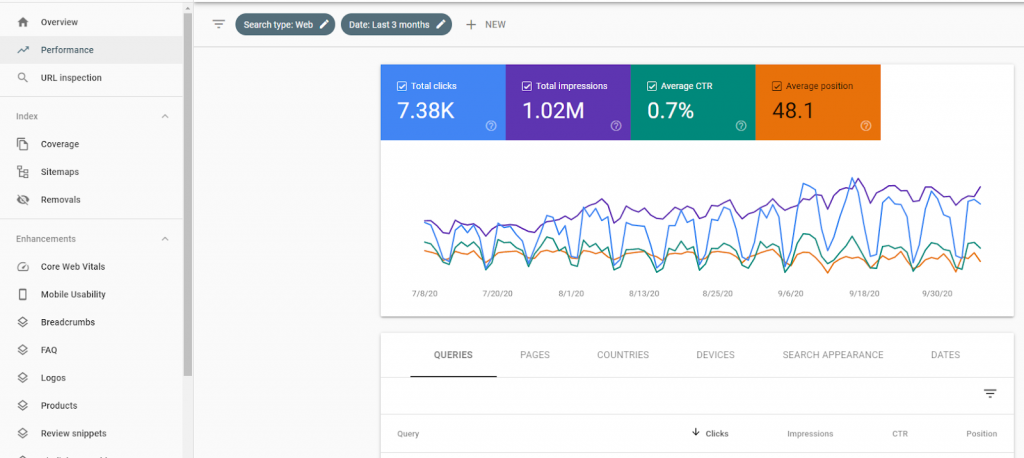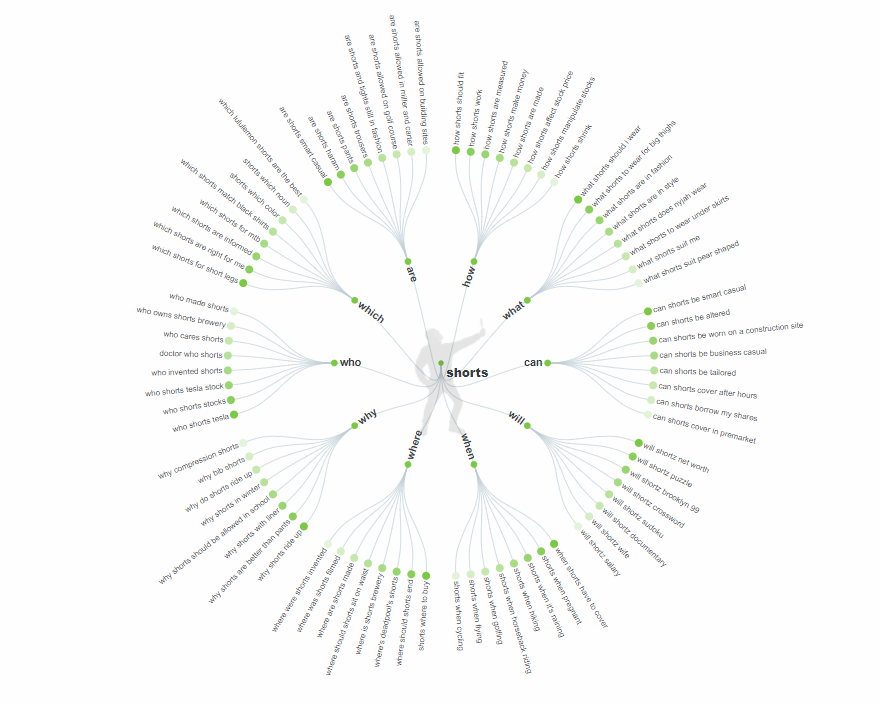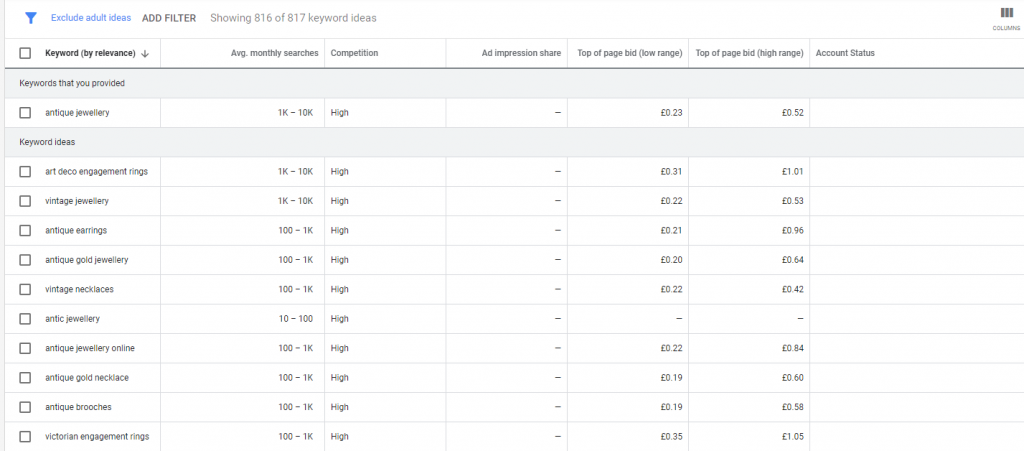The use of real, tangible search data is a tried and tested method for informing content strategies. There are various tools that can be used for this purpose, and the information you can glean from each of them will help in different types of content ideation.
Coming up with fresh content ideas is no mean feat. But, if marketers properly utilize valuable search data, it should be possible to deliver content that makes an impact and helps you to achieve your digital goals – whatever they may be.
Tools to use to assess valuable search data
Thanks to an ever-increasing demand for marketing insights, there are many platforms that can be used to gather search data and assist with your SEO and content writing efforts. Some popular ones include:
- Google Search Console (FREE)
- Ahrefs (FREE & PAID)
- Answer The Public (FREE & PAID)
- Google Ads Keyword Planner (FREE)
Using Google Search Console
Looking for new content ideas starts at home. The first place you should be looking to research is your own website. This is because existing successful content often highlights other, similar untapped opportunities.
Google Search Console is a very helpful, free tool that allows you to gain a better understanding of the performance of your website’s existing content. This is achieved using Search Console’s ‘Performance’ or ‘Search Results’ report.

It’s possible to look at and compare your pages and posts to find out what search terms have been used to find them, how many clicks and impressions these terms have delivered, and in which countries and on what devices. Here, you can also input specific date ranges to understand the differences between what search terms are used and when.
When it comes to informing new content, the search data obtained from Google Search Console can be helpful in this respect. You may have a piece of content that was optimized for specific keywords, only to discover that there are topically similar, additional terms appearing in your Search Console’s Performance report. If this term generates a considerable number of impressions, but it is ultimately not relevant enough to the existing content, it’s worth thinking about producing a new piece of content that will better meet the searcher’s intent.
For example, you might have a blog post about video conference tools that is targeted at ‘zoom vs skype’. In search console, alongside your target keywords, you might find that it is also highlighting keywords that are not directly related to the content on page – e.g. ‘zoom vs teams’.
This keyword is similar enough to make your content show in the search results, but not necessarily relevant enough to rank well for it. So, from this data, depending on the competition, we could consider creating a content piece on ‘Zoom vs Microsoft Teams’.
MRS Digital Recommends:
First identify your top performing pieces of content on your website looking at the ‘Pages’ tab in the Performance report. Then, once you have these, analyze them individually. In the report, you want to be looking for keywords with high impressions and a click-through-rate of less than 1%.
Using Ahrefs
Ahrefs is a popular tool for keyword research and content ideation. There are a number of tools that can be used to help you formulate content ideas, the most prominent being the Keywords Explorer tool and the Site Explorer tool (paid for).
Keyword Explorer
Upon typing a keyword into the Keywords Explorer tool, it’s possible to see the overall trend and average number of times the keyword is searched per month in search engines. This can be very helpful when it comes to determining how much of a traffic driver a piece of potential content could be.
In particular, the ‘Questions’ and ‘Newly Discovered’ keyword idea sections in Keyword Explorer can be very useful when it comes to content ideation. By simply typing in a broad subject matter, you can access a list of relevant mid-to-high volume, related questions to do with that subject, as well as newly discovered searches (user data that was recently added to the Ahrefs database).
Site Explorer
Similar to Search Console’s Performance report, Ahrefs’ Site Explorer tool can be used to look at the keywords that are currently ranking your website’s content. Following the same process as with Search Console, you can pick out keywords that could be better targeted within individual pieces of content dedicated to that topic.
However, it’s worth bearing in mind that as these keywords are lifted from a database rather than directly from Google, these will be higher volume terms that may be more competitive in search to those you would find in Search Console.
MRS Digital Recommends:
Once you have analyzed your own website for content ideas, you can analyze competitors’ websites in Site Explorer to discover content that has been successful for them. This allows you to consider similar topics or even replicate their content – making yours better and more usable.
Answer The Public
AnswerThePublic is an incredibly useful website that pulls autocomplete data directly from search engines like Google. It offers free and ‘Pro’, paid-for usage. You simply input a topic or keyword, and AnswerThePublic organizes keywords alphabetically and into filtered groups based on searches that real users are inputting into search engines.
These handy groups include question searches like ‘what’, ‘where’, ‘how’, ‘why’ and ‘when’, showing you exactly what people are asking around your keyword:

They also split searches into groups using prepositions like ‘with’, ‘without’, ‘for’ and ‘to’ and comparisons like ‘vs’, ‘versus’, and ‘or’.
This is a very easy way to identify new content ideas surrounding a specific subject thanks to real user data. The way it is split also allows you to easily identify content for different stages of the buying cycle – for example looking at comparative ideas for the ‘Consideration’ stage – ‘hp laptop vs dell laptop’.
MRS Digital Recommends:
Use AnswerThePublic for more niche topics that are difficult to research with tools like Ahrefs – this is where you’ll find the most success with AnswerThePublic. Also, use sparingly if you are relying on the free version – you only get two searches max a day!
Google Ads’ Keyword Planner
Finally, another way of examining search data to help generate content ideas is to assess search terms in Google Ads’ Keyword Planner. Simply type in a keyword / topic to discover new searches that real users have performed.
The main benefit of using Google Ads’ Keyword Planner is that you can highlight the competitiveness of a keyword by looking at their estimated cost-per-click in PPC advertising – i.e. the higher it is, the more competitive it is likely to be, not just in paid search.

MRS Digital Recommends:
You can also use Google Ads’ Keyword Planner to discover seasonality of a search and see when search volume trends increase and decrease on a monthly basis. This can assist with the scheduling of your content.
Search Data is Valuable – But It Doesn’t End There
Although all the platforms above are a great way to inspire content ideas, you should not rely solely on them. Using traditional content idea methods like mind-mapping and creative content meetings are great ways to start, and then use data from these platforms to verify your ideas.
Measuring Your New Content’s Results
Of course, once you have created your new content, you need to measure its success. You can do this using a combination of tools. The first, being the aforementioned Google Search Console. Not only can you see the individual keywords ranking the content, alongside their impressions, rankings and clicks, you can also see the page’s total clicks, impressions, CTR, and position over time. This gives you a nice, clear overview of visibility and performance of your content.
For keeping a closer, more in-depth eye on target keywords’ performance, you can use any number of industry-recognized keyword tracking tools like Oncrawl Rankings. Tools like Oncrawl Rankings help you to understand how your new content is found on search engines and how your content’s on-site SEO indicators are influencing your ranking positions. This allows you to surmise the common characteristics of pages that are ranking compared to yours.
Don’t forget traffic! Your new content may have acquired some or all of its target keywords, but is it delivering the traffic levels you expected? You need to determine whether your content is attracting users – especially if you have targeted longer-tail keywords. For this, we would recommend using Google Analytics, measuring your traffic over time through your different channels (focusing on Organic – those naturally finding you in search results).
Important – Get Technical
Don’t let your content writing efforts go to waste. Technical SEO must always come into the equation when you’re creating content. You should always consider:
- Crawl equity – Make sure your important pages are the ones that are crawled. Consider removing and redirecting old content that doesn’t perform / have a purpose anymore.
- Multimedia file sizes – Make sure you optimize file sizes and consider using next gen- image formats when using multimedia in your content.
- Dynamic Sitemaps – Does your website have one? Your sitemap should automatically update when you add new content to your site to ensure it’s crawled.
- Submitting content to index – Don’t forget to submit your new content to the index via Google Search Console once you’ve uploaded.
It’s important to run consistent technical audits to ensure your website’s technical health isn’t detrimental to your content.
Investing Time Wisely
It’s imperative to make sure that the content you invest time in creating has a purpose and meets searchers’ intent, otherwise it simply won’t be seen. By investing time in exploring the data offered by all the platforms that are available to you, it should be possible to generate a wealth of new content ideas that can work hard to help you achieve more traffic.

